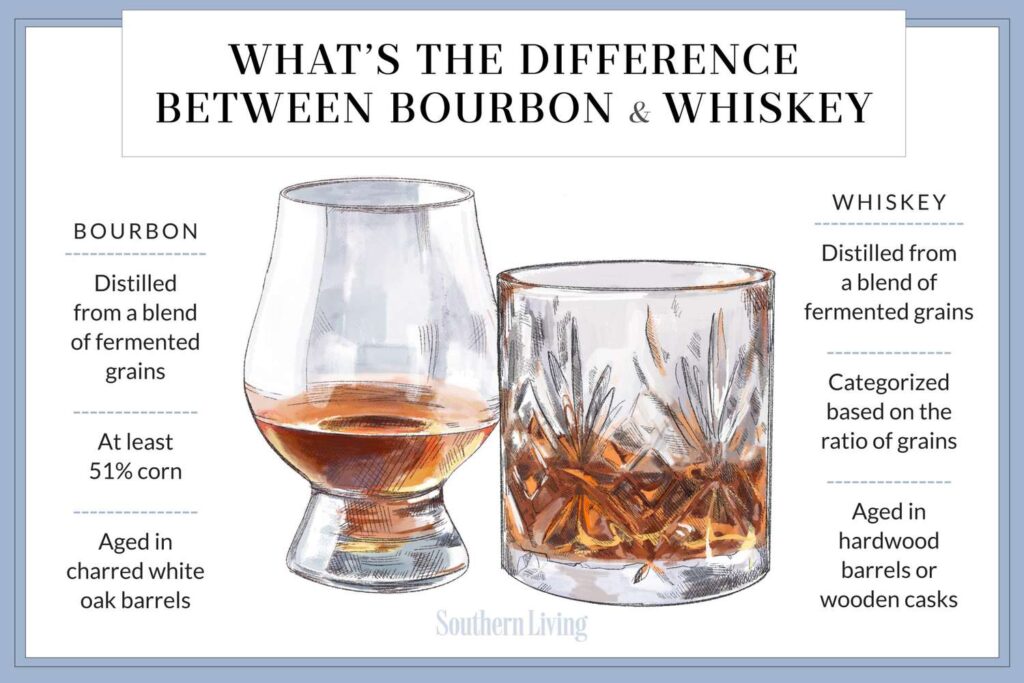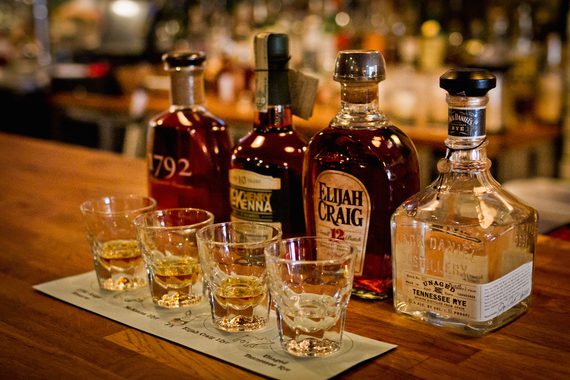If you've ever found yourself wandering down the liquor aisle or lingering at a bar, you've likely pondered the golden mysteries that lie within bottles labeled both 'whiskey' and 'bourbon'. So, what sets them apart, and why does it matter?
The Legacy of Bourbon: America's Distinctive Drink
Whiskey is an umbrella term that encompasses a diverse range of distilled spirits. These spirits are made from fermented grain mash, which can include barley, corn, rye, and wheat. But when you delve into the world of bourbon, you're stepping into a drink steeped in American history, with specifications that set it distinctly apart.
1. The Majestic Corn's Reign
At the heart of every bottle of bourbon lies its primary ingredient: corn. For a spirit to be considered bourbon, it must be distilled from a grain mixture that’s at least 51% corn. This dominant corn content provides bourbon with its signature sweetness—a gentle undertone that differentiates it from the sharper tastes of some other whiskeys.
2. The Barrel's Charmed Life
Whiskey in general matures within barrels, yet bourbon's requirements are specific and strict. It demands aging in new charred oak barrels, which are responsible for infusing the spirit with those caramel and vanilla notes enthusiasts cherish. This charring process, quite unique to bourbon, is where the magic truly happens.
3. Born in the USA
Bourbon's roots are undeniably American. In the same way that Champagne has to originate from the Champagne region of France to earn its title, bourbon must be distilled and matured within the United States to wear its name with pride. Though Kentucky is famed for its bourbon contributions, any state in the U.S. can produce this iconic spirit.
4. Evolution through Time
Bourbon's evolution can be traced back to the 18th century, when settlers first started experimenting with native crops for distillation. Corn, abundant in the region, naturally became a staple. Over time, as regulations and standards set in, the bourbon we recognize today began to take shape, becoming an embodiment of American craftsmanship and tradition.
5. Bourbon's Role in Popular Culture
From the world of literature to the big screen, bourbon has enjoyed its share of the limelight. Its presence in classic movies, its mention in memorable songs, and its role in iconic moments have cemented bourbon's place not just as a drink, but as a cultural icon.
Conclusion: More than a Drink, It's a Legacy
Bourbon isn't just another spirit on the shelf—it's a narrative of American history, passion, and innovation. Its intricate production process, stringent criteria, and storied past make it a drink worthy of its praise. Whether you're a seasoned bourbon aficionado or a curious novice, there's always more to discover and appreciate about this legendary American spirit.

FAQ's
1. Q: What is bourbon whiskey?
A: Bourbon whiskey, often simply referred to as bourbon, is a type of distilled American spirit made primarily from corn and aged in new charred oak barrels.
2. Q: Is all whiskey bourbon?
A: No, all bourbon is whiskey, but not all whiskey is bourbon. Bourbon has specific criteria it must meet, like being made from at least 51% corn and being aged in new charred oak barrels.
3. Q: Can bourbon be made outside the U.S.?
A: To be labeled as bourbon, it must be produced in the U.S. However, similar spirits can be made elsewhere; they just can't carry the bourbon designation.
4. Q: Why is bourbon often associated with Kentucky?
A: Kentucky is the birthplace of bourbon and remains its production hub. The state's unique limestone water and climate make it ideal for bourbon production.
5. Q: What's the difference between bourbon and Scotch?
A: Bourbon is American and made primarily from corn, while Scotch is whiskey from Scotland made mainly from malted barley.
6. Q: How long is bourbon aged?
A: While there's no minimum aging period for most bourbons, to be labeled as "straight" bourbon, it must be aged for at least two years.
7. Q: Why are bourbon barrels charred?
A: Charring caramelizes the sugars in the wood, imparting bourbon with its distinctive caramel and vanilla flavors.
8. Q: Can bourbon barrels be reused?
A: While bourbon requires new charred oak barrels, these barrels can be reused by other industries, like Scotch whisky and rum producers.
9. Q: How is bourbon different from Tennessee whiskey?
A: One primary difference is the Lincoln County Process, where Tennessee whiskey is filtered through sugar maple charcoal before aging.
10. Q: Is bourbon always strong or high-proof?
A: No, but by law, bourbon must be distilled to no more than 160 proof and entered into the barrel for aging at no more than 125 proof.
11. Q: How do I best enjoy bourbon?
A: Bourbon can be enjoyed neat, on the rocks, or as part of a cocktail. The preference is personal and varies from one individual to another.
12. Q: Are there different types of bourbon?
A: Yes, based on aging and ingredients, bourbons can be classified as straight bourbon, high-rye bourbon, or wheated bourbon, among others.
13. Q: What cocktails are made with bourbon?
A: Some classic bourbon cocktails include the Old Fashioned, Mint Julep, and the Whiskey Sour.
14. Q: Can I cook with bourbon?
A: Absolutely! Bourbon is used in various recipes, from savory dishes to desserts, to enhance flavors.
15. Q: Is bourbon gluten-free?
A: The distillation process typically removes gluten proteins, but people with severe gluten sensitivities or celiac disease should consult with professionals.
16. Q: Why does bourbon have a sweet taste?
A: The high corn content and the caramelized sugars from the charred barrels give bourbon its characteristic sweetness.
17. Q: Are there health benefits to drinking bourbon?
A: Like other spirits, moderate consumption can have certain health benefits. However, excessive consumption can be harmful.
18. Q: How do I store an open bottle of bourbon?
A: Keep it upright in a cool, dark place. Avoid direct sunlight and extreme temperatures.
19. Q: Can bourbon go bad?
A: Once opened, bourbon can oxidize, which might change its flavor. Sealed bottles can last indefinitely if stored properly.
20. Q: Why is some bourbon so expensive?
A: The price can be influenced by factors like age, rarity, production methods, brand reputation, and special editions.
